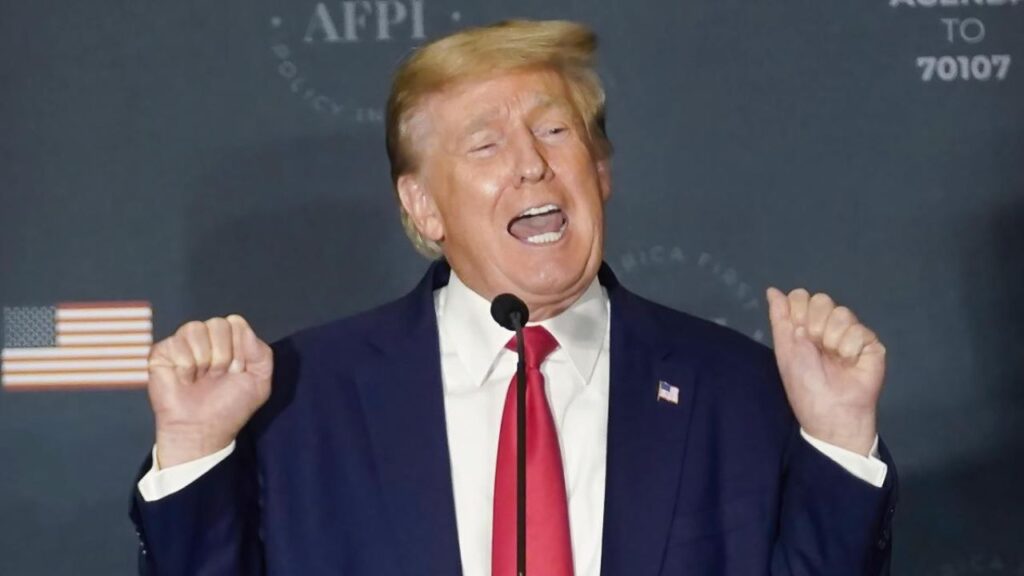In his second term as president, Donald Trump has made waves by declaring his intent to ban transgender athletes from competing in women’s sports. This issue has ignited fierce debates across the country, dividing political parties, athletes, and the general public. Trump’s stance, rooted in the argument that “men must be kept out of women’s sports,” has galvanized his supporters and drawn sharp criticism from opponents. While the topic involves a small percentage of the population, its political and cultural implications are anything but small.
On the campaign trail, Trump consistently highlighted this issue, even making it a cornerstone of his platform. He frequently referred to it as a matter of fairness and protection for women’s sports, a position that resonated with many voters, including some lifelong Democrats. Inga Thompson, a former Olympic cyclist and self-described Democrat, admitted to shifting her support to Trump over this single issue. For Thompson and others like her, the preservation of what they see as fairness in women’s sports outweighs their disagreements with Trump’s other policies or rhetoric.
Donald Trump says transgender athletes will not be allowed to participate in women’s sports. pic.twitter.com/hvviSk2CVZ
— Globe Eye News (@GlobeEyeNews) January 20, 2025
This sharp focus on transgender athletes in sports has come as broader debates about gender identity have gained prominence in politics and society. While only about 1% of Americans identify as transgender, the Republican Party has amplified the issue, framing it as a broader cultural battle. For Trump, this strategy has proven effective in mobilizing his base, and polling data suggests significant bipartisan agreement on the topic. A recent survey revealed that a majority of Americans, including 67% of Democrats, oppose allowing transgender women to compete in women’s sports.
Critics argue that this focus on transgender athletes is a manufactured controversy that disproportionately targets a marginalized group. Transgender women winning against cisgender women in elite competitions is exceedingly rare, and existing regulations already create barriers for participation. For instance, the International Olympic Committee (IOC) and various sports federations have guidelines for transgender athletes that often require them to meet strict hormone-level criteria. Nonetheless, the conversation has frequently veered into sensationalism, with high-profile cases, such as Lia Thomas and Austin Killips, becoming flashpoints in the debate.
The ripple effects of these policies extend beyond transgender athletes. Some cisgender women have found themselves caught in the crossfire, their accomplishments questioned based on appearance or performance. For example, Algerian boxer Imane Khelif faced accusations of being transgender after her gold medal win at the 2024 Olympics, leading to a barrage of online abuse. Even renowned swimmer Katie Ledecky was targeted by unfounded claims, highlighting how these debates can undermine the achievements of all women in sports.
TRUMP: “We’re going to stop the transgender lunacy. I will sign executive orders to end child s*xual m*tilation, get transgender out of the military and out of our elementary schools. We will keep men our of women’s sports!”
“It will be the official policy of the United States… pic.twitter.com/Lb7hP2wG58
— Libs of TikTok (@libsoftiktok) December 22, 2024
Trump’s policy proposals have emboldened some to demand stricter categorizations in sports, but they have also sparked concern about the broader implications of such rigid definitions. The binary approach to gender fails to account for intersex athletes and others who don’t fit neatly into traditional categories. Critics warn that these policies risk eroding inclusivity and fairness, potentially harming cisgender, intersex, and transgender athletes alike.
Beyond sports, this issue underscores deeper societal tensions about identity, fairness, and representation. Trump’s critics contend that his focus on this topic is a distraction from more pressing national issues. Meanwhile, supporters see it as a stand for common sense and traditional values in a rapidly changing cultural landscape.
While Trump’s executive orders may temporarily shape federal policy, the long-term resolution of these debates will likely depend on the courts, particularly in interpreting Title IX. Originally designed to ensure equal opportunities for women in education and sports, Title IX has become a battleground for defining s*x versus gender. Recent efforts by the Biden administration to expand Title IX to include gender identity were struck down in court, giving Republicans momentum to pursue more restrictive definitions.
Donald Trump announced at the Liberty Ball that we do not want MEN playing in Women’s Sports
Also said we do not want tr*nsgender operations for everyone
AMERICA IS HEALING ❤️ pic.twitter.com/WcOLCvNxuc
— Ola Olayemi (@kunleolayemi) January 21, 2025
For athletes, advocates, and policymakers, the stakes are high. Supporters of transgender inclusion argue that creating pathways for participation fosters diversity and challenges outdated norms. Opponents, however, maintain that protecting women’s sports requires clear boundaries based on biological s*x. Both sides claim to champion fairness, yet their visions of what fairness entails couldn’t be more different.

